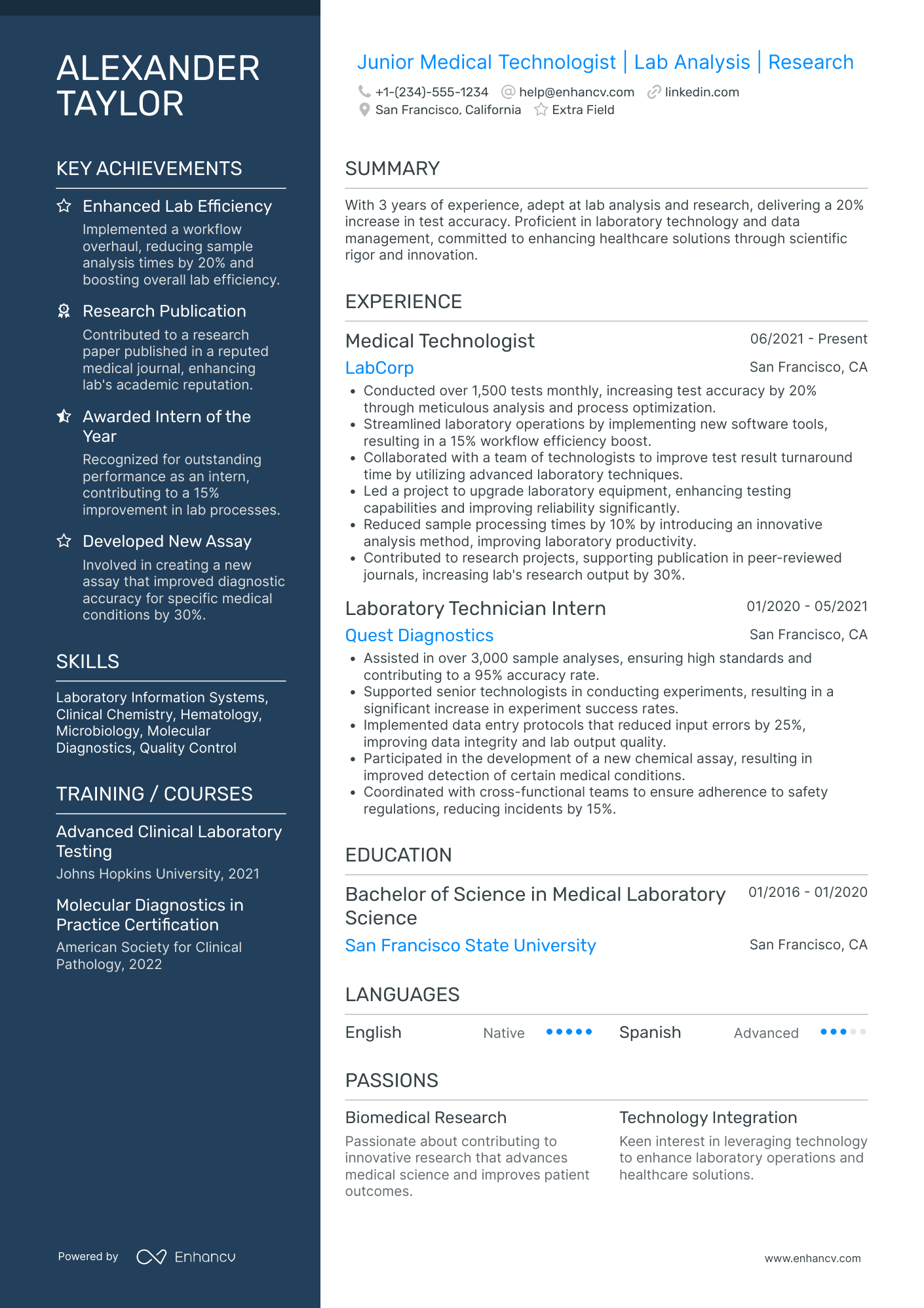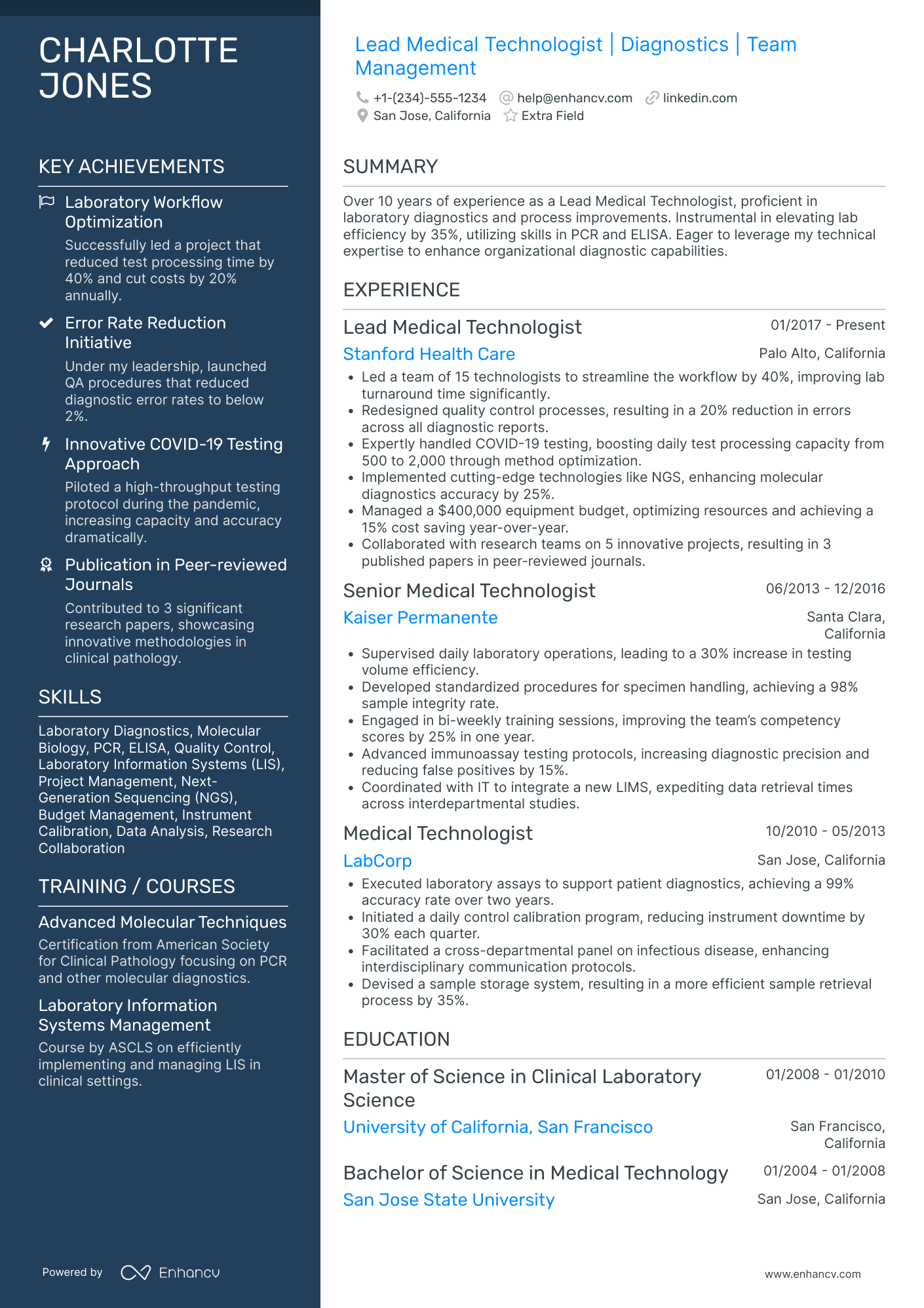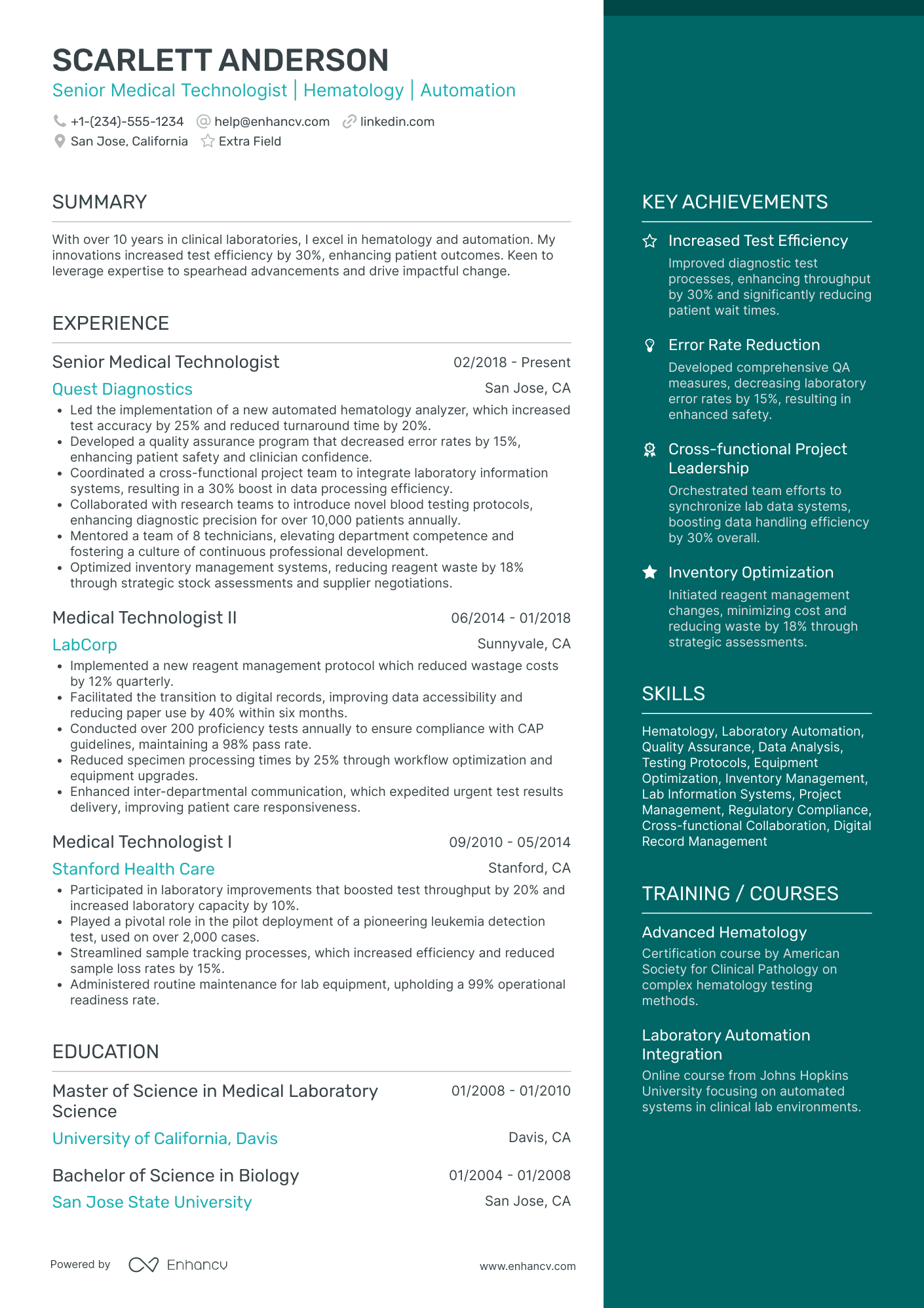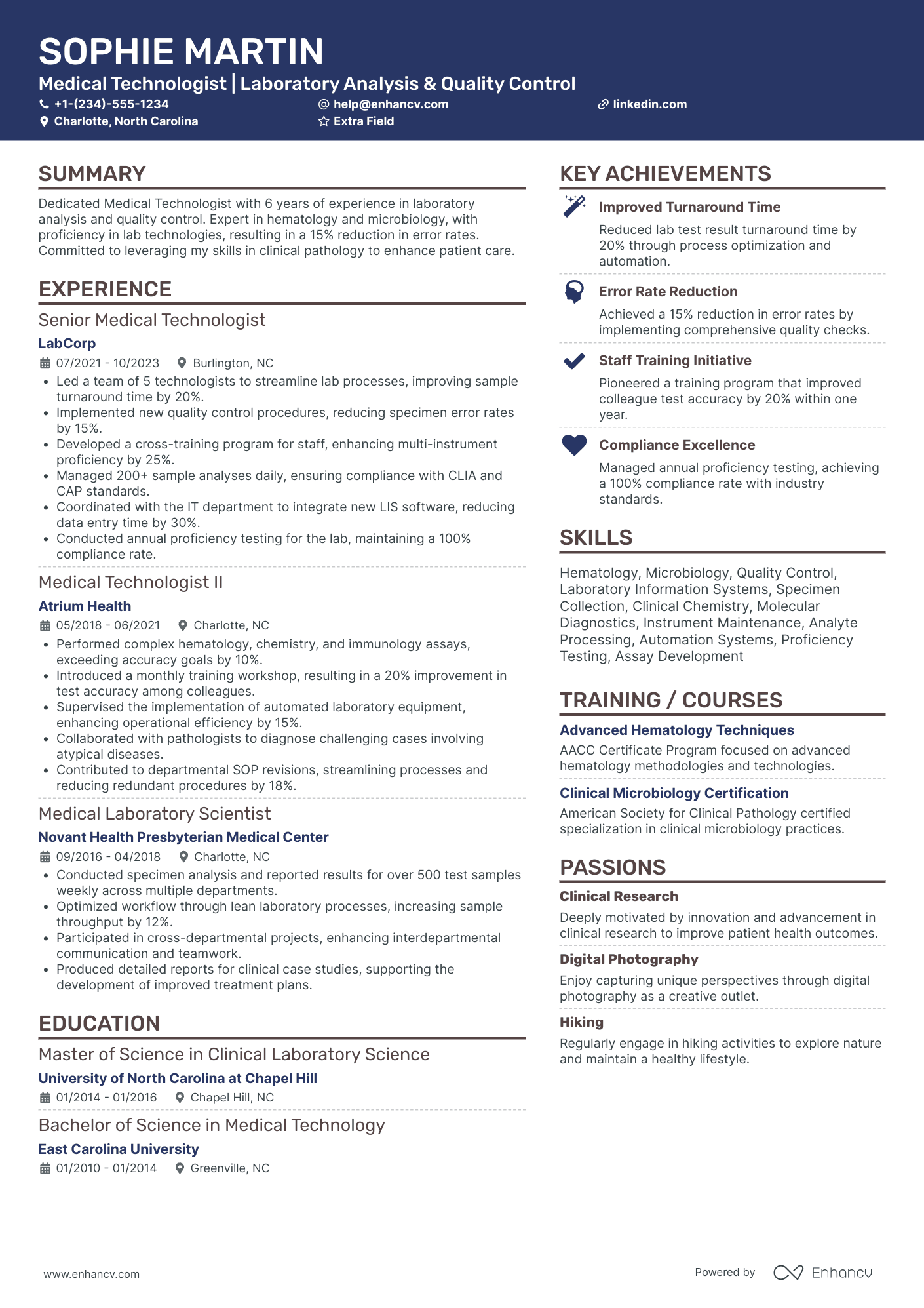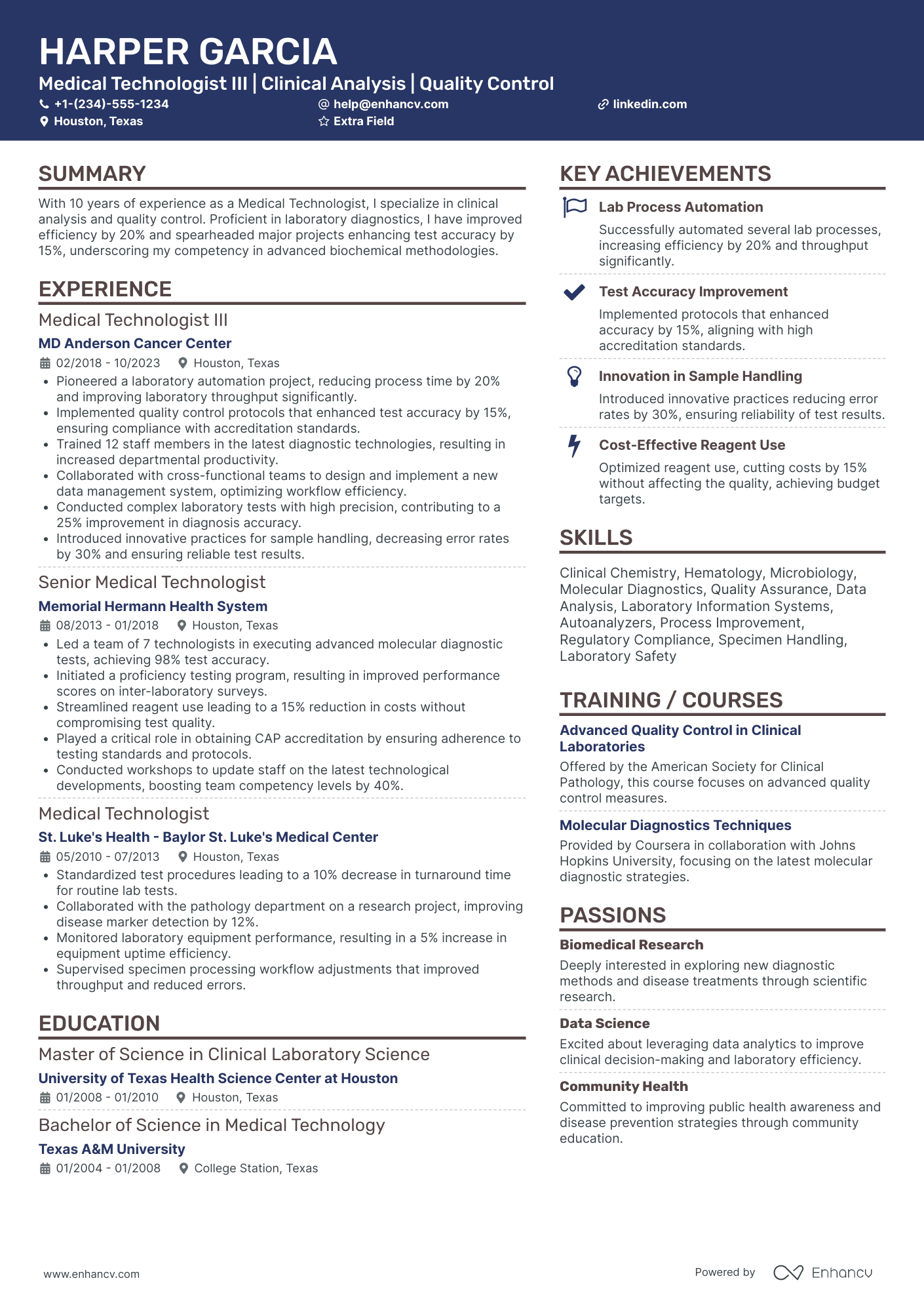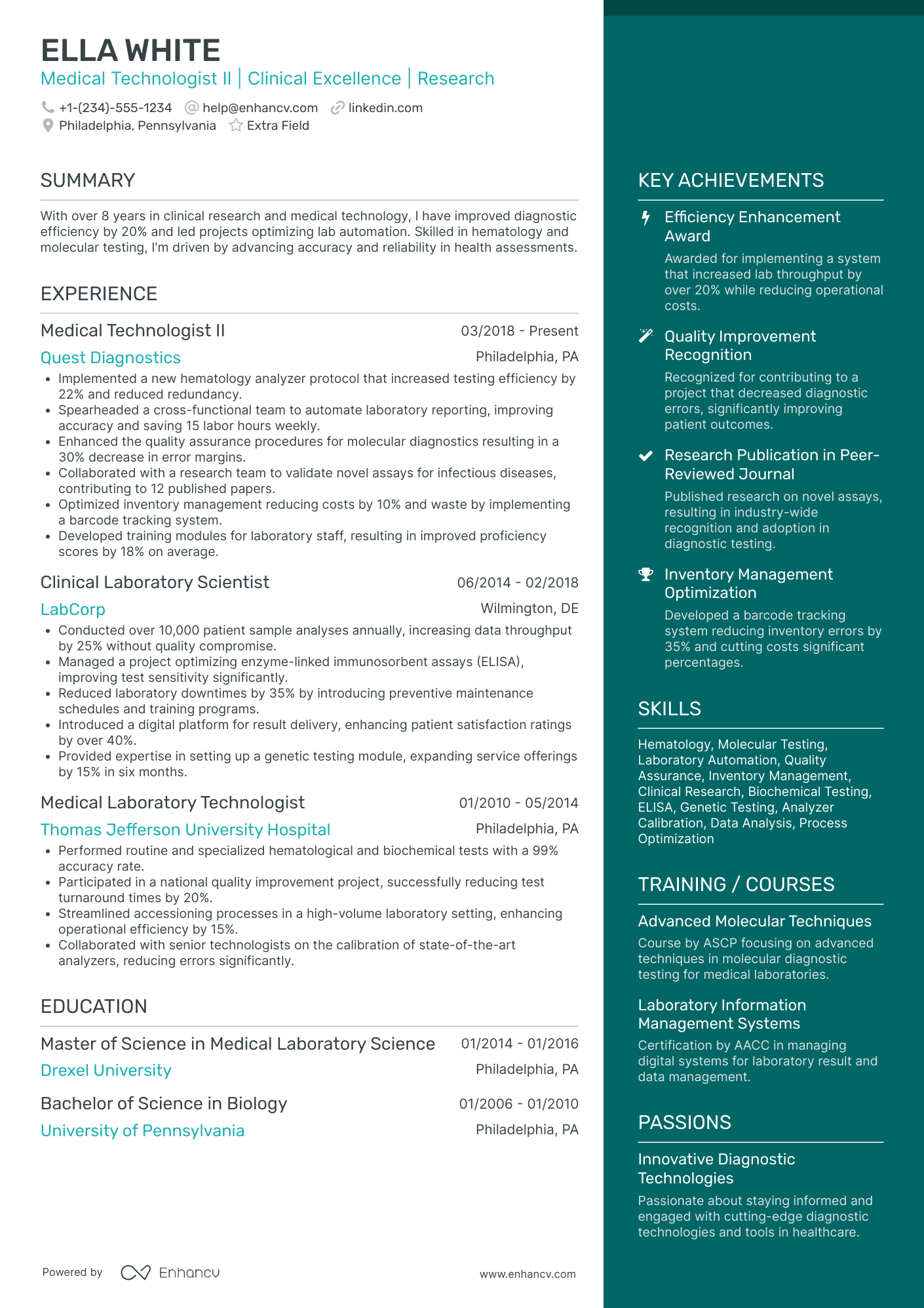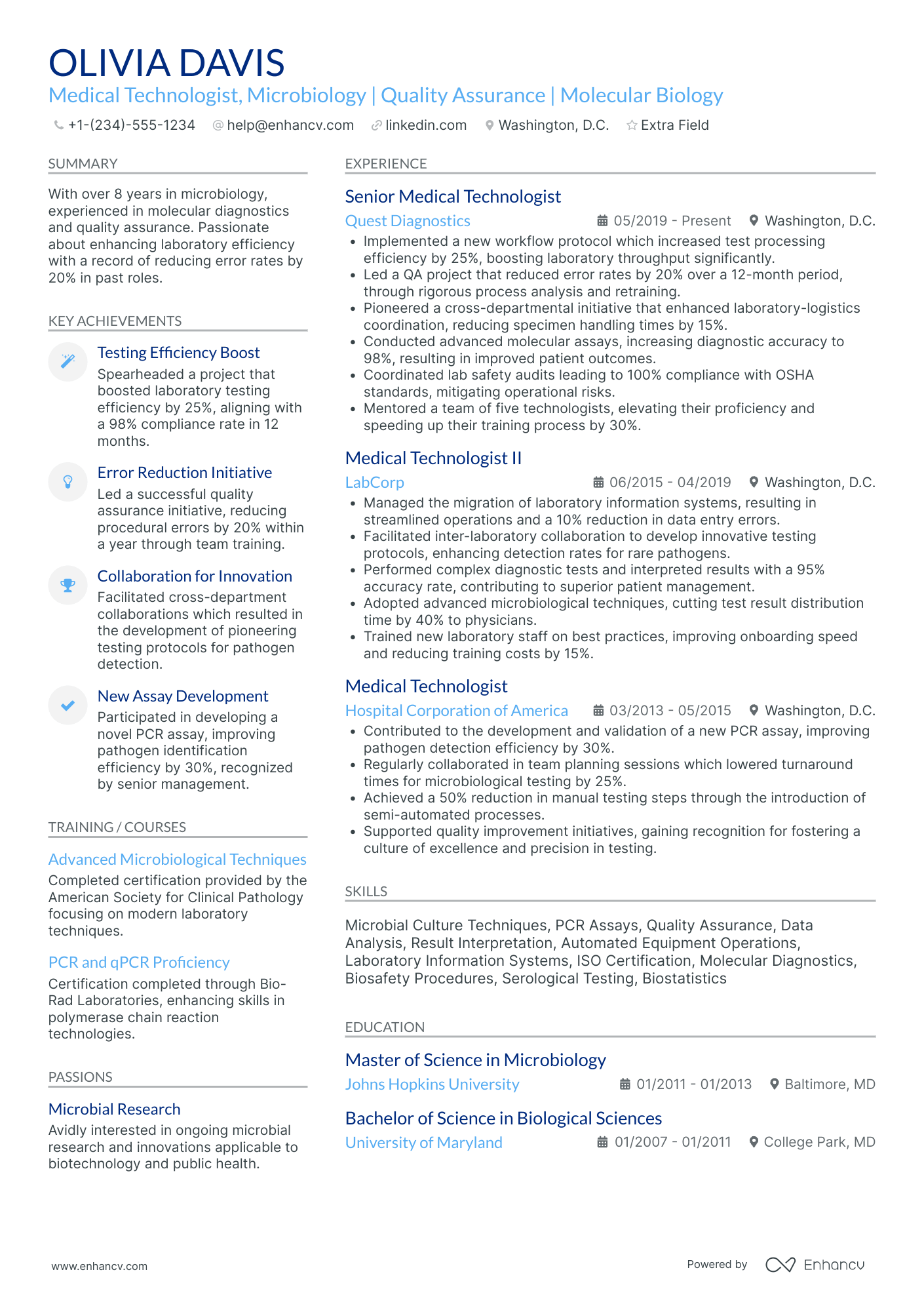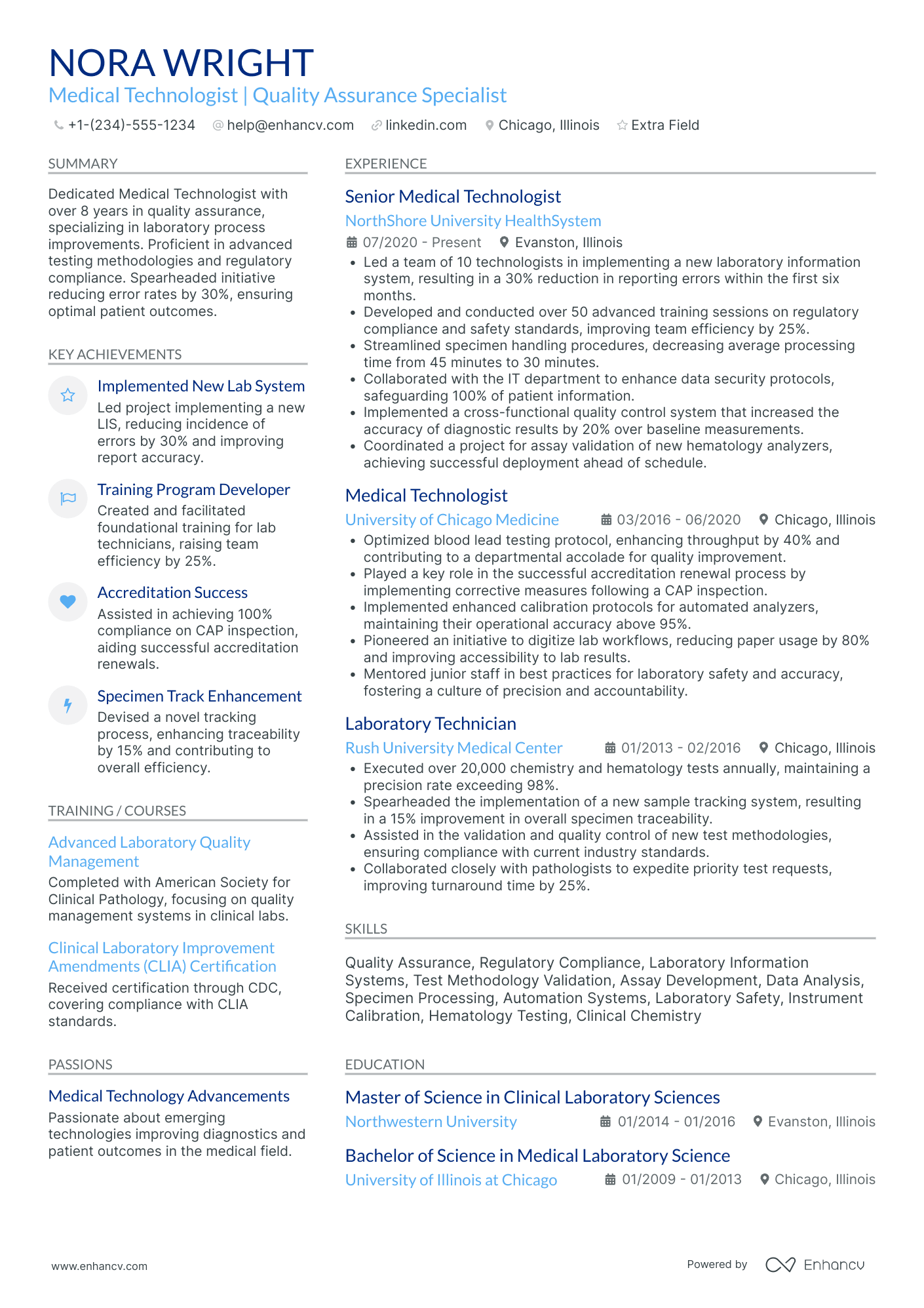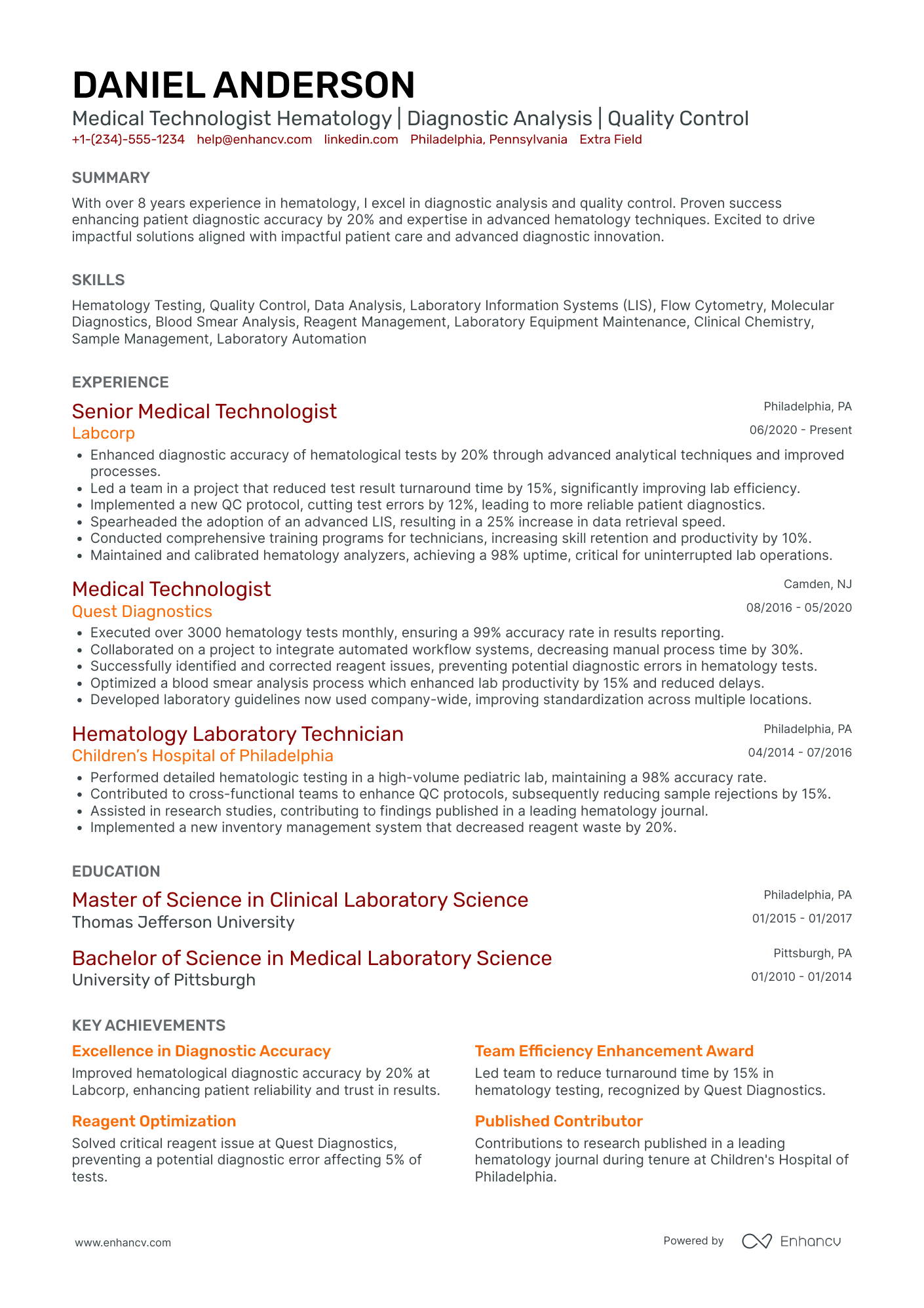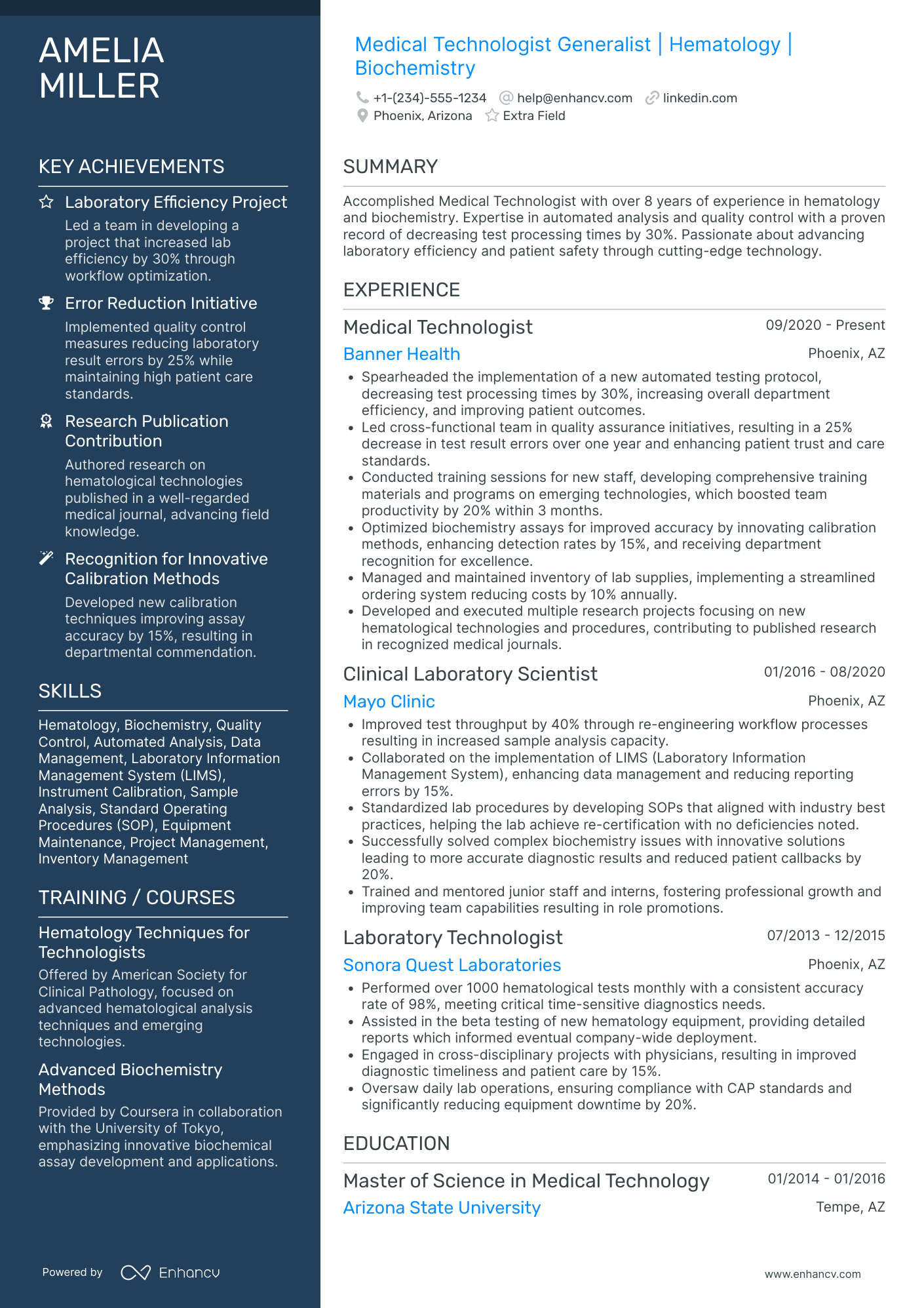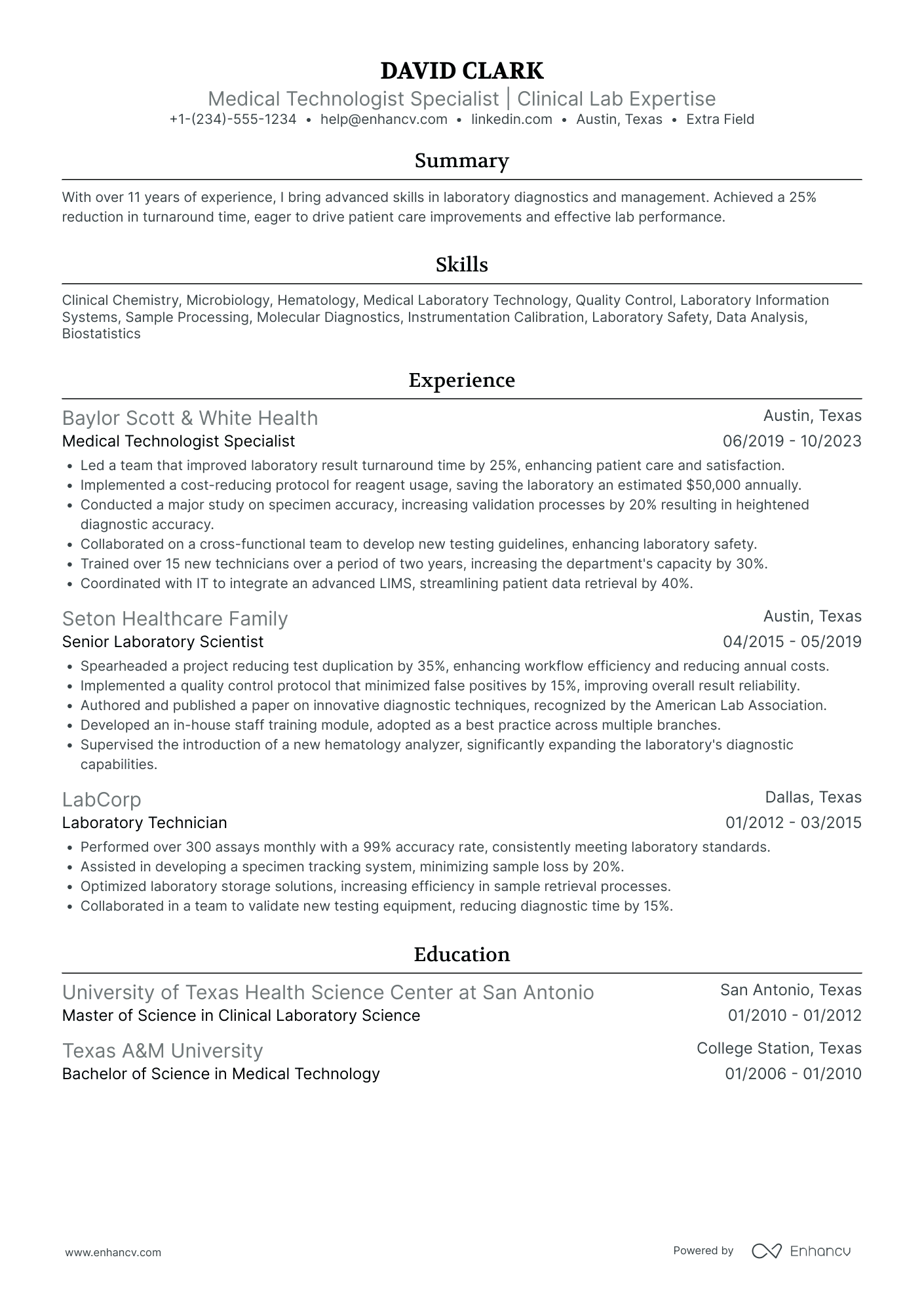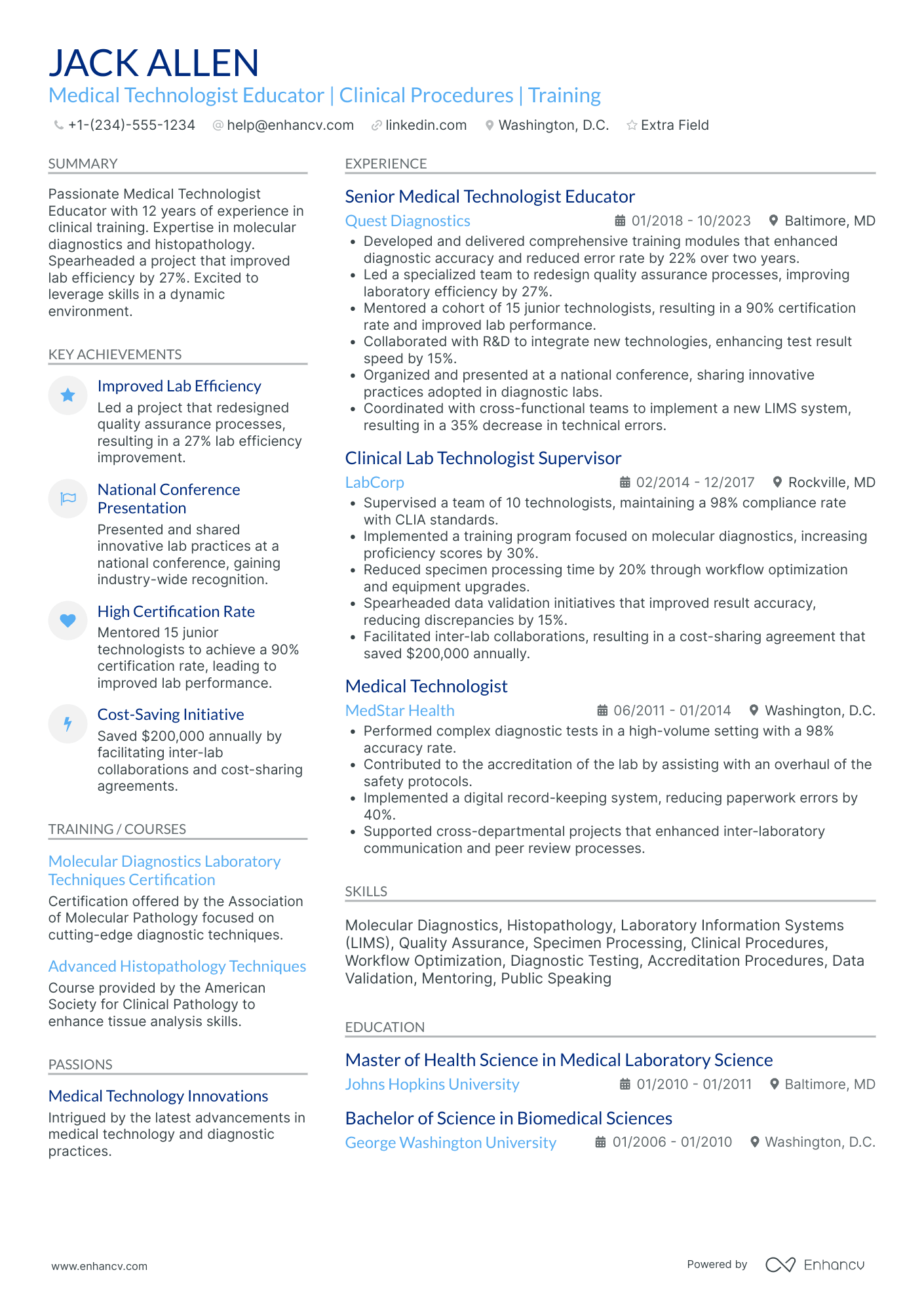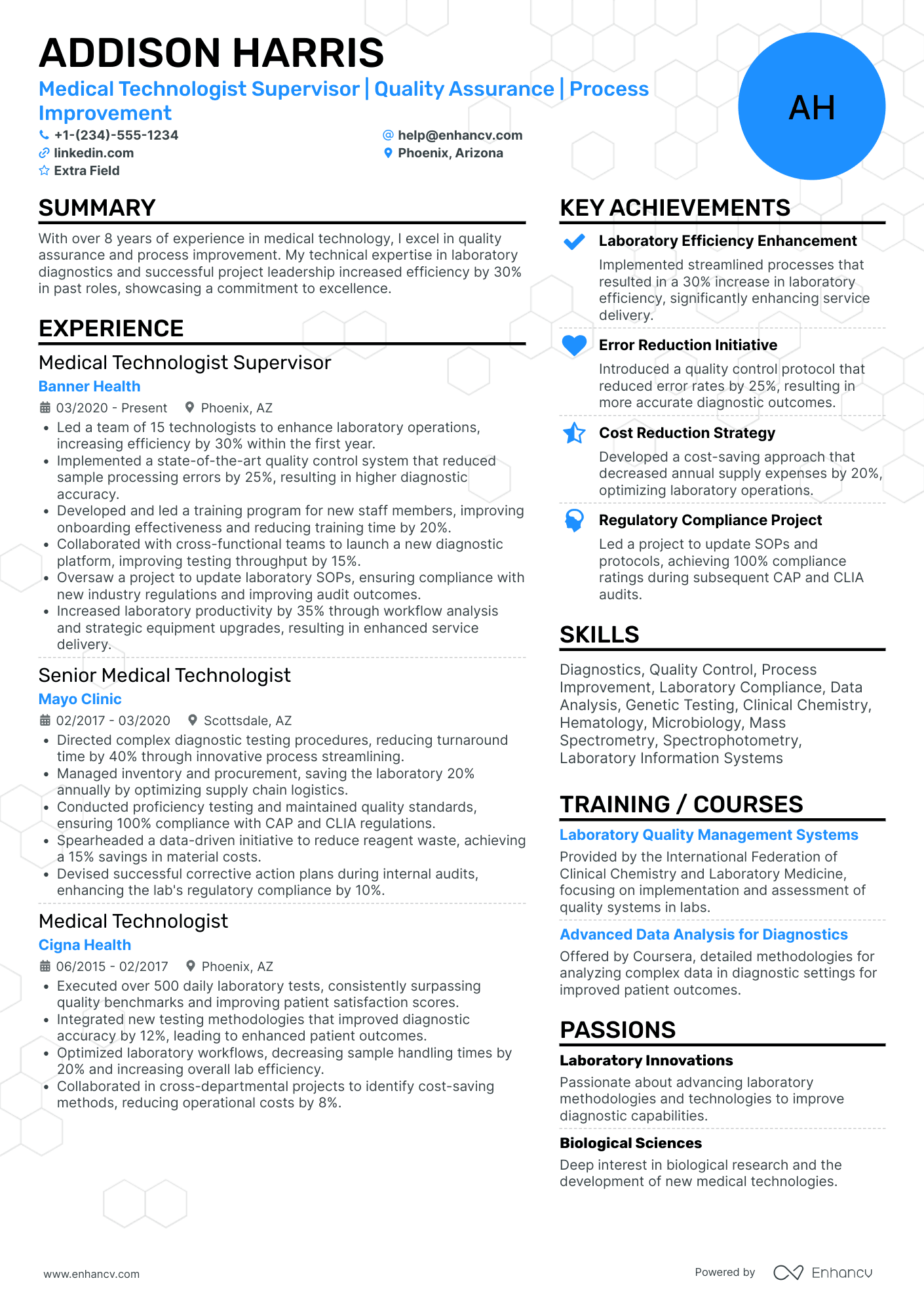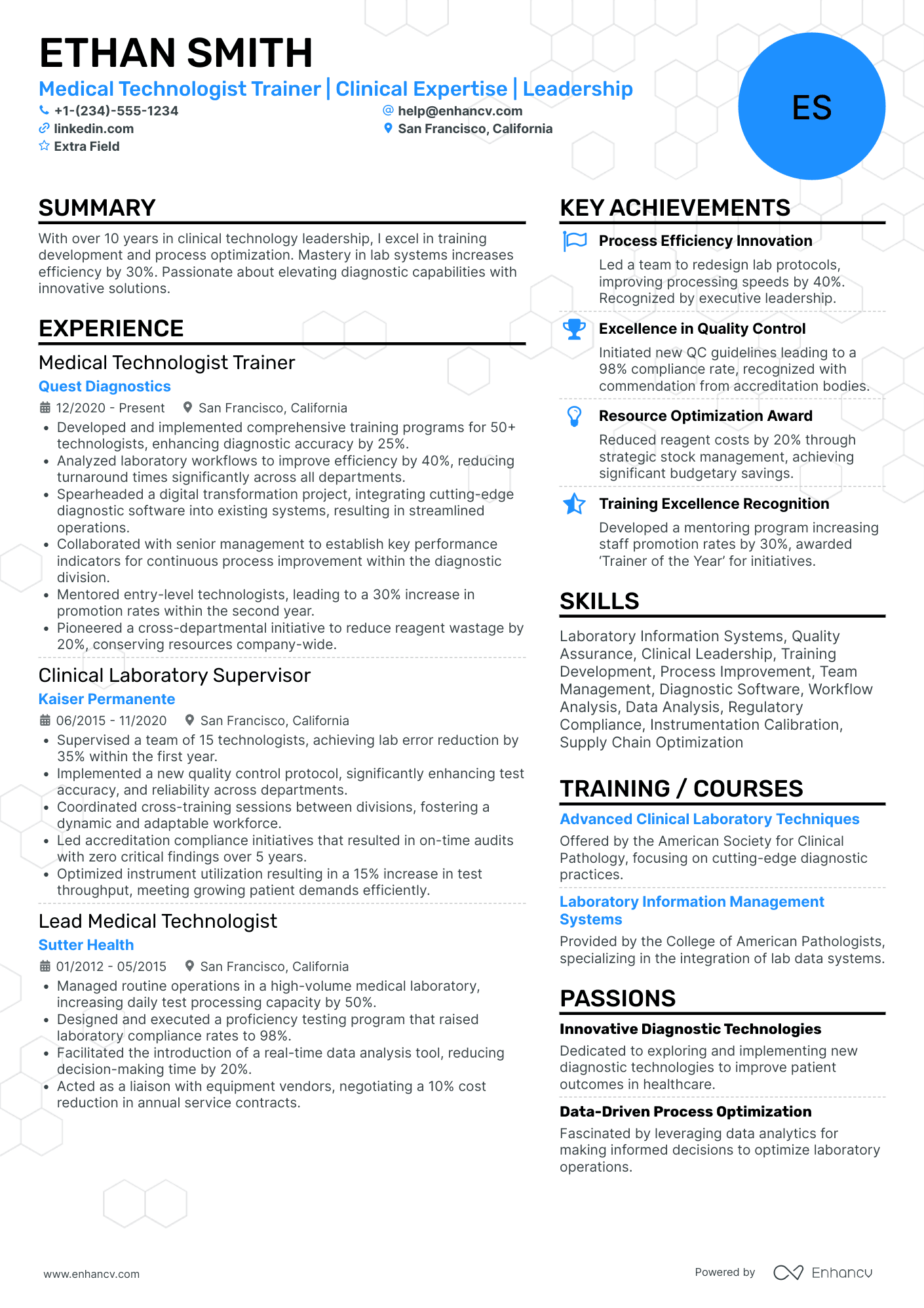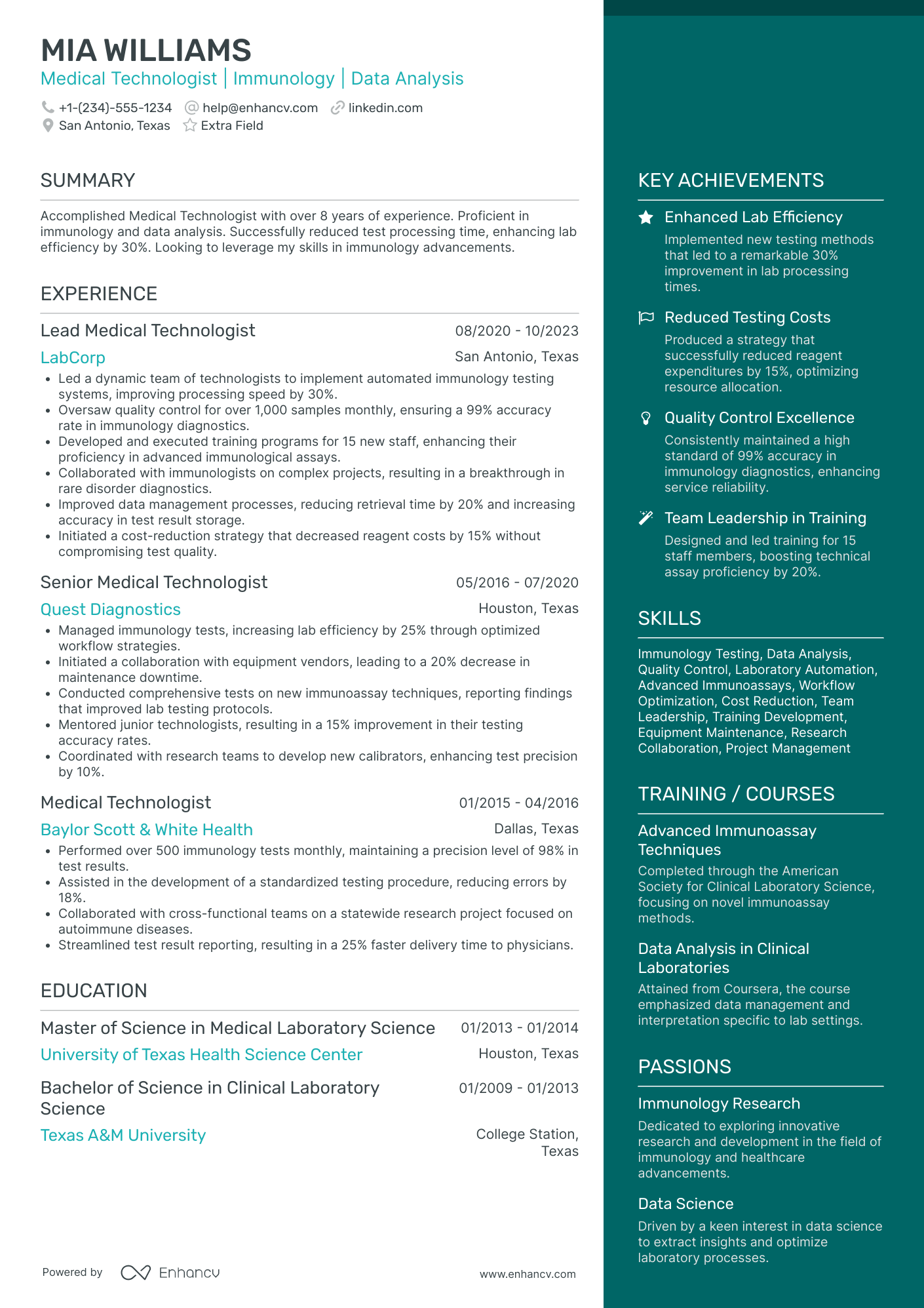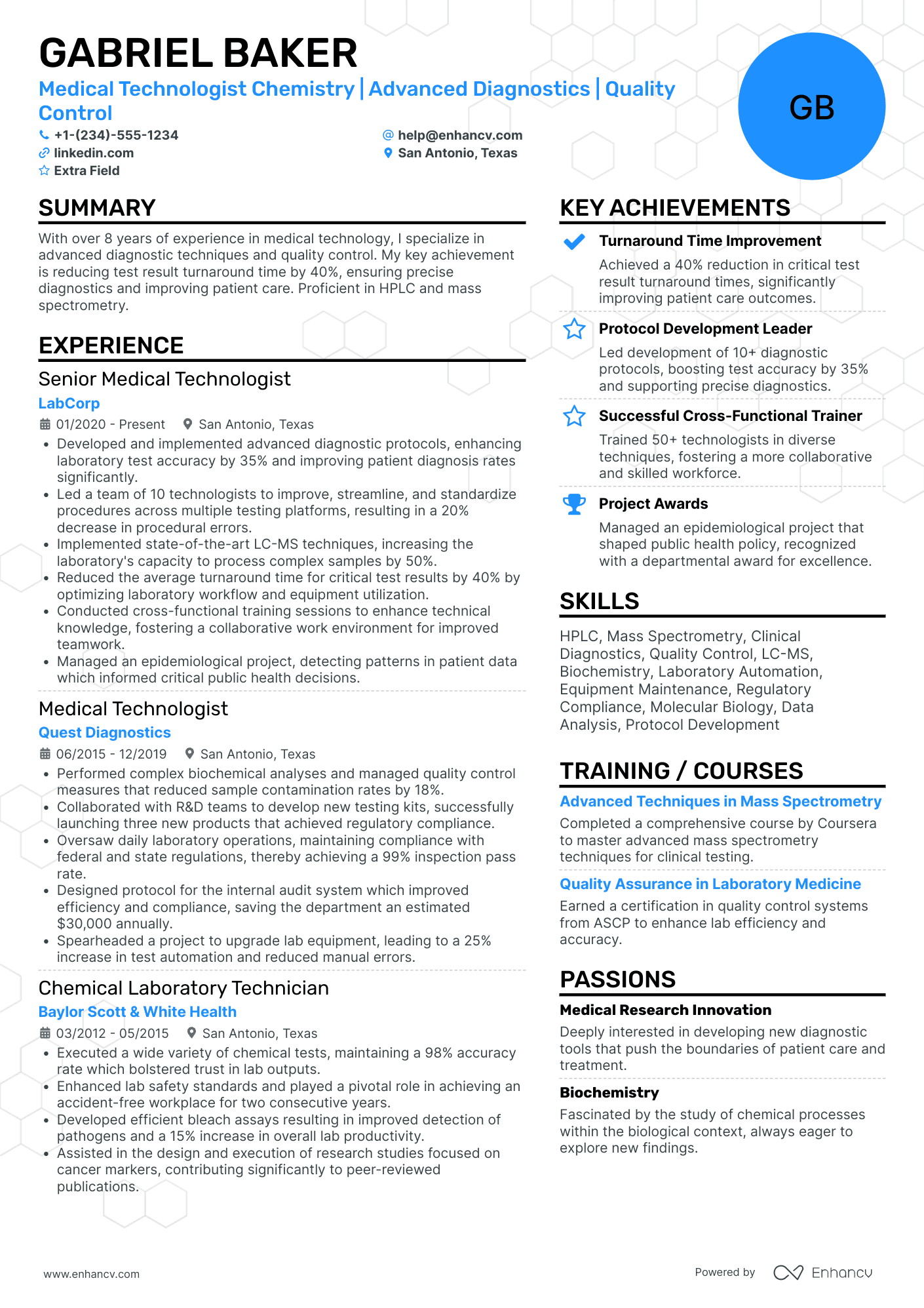You're here to make a job-winning resume that transforms your career.
You hold life and death in your hands each time you perform a new test.
Medical technologists have a lot to offer in labs and hospitals. And doctors' work can never be complete without their assistance.
For starters:
You deal with the hardest disease types in the world. And your job requires lots of accuracy and reliability because you're dealing with a patients' life.
On top of that:
Your work is crucial to getting a diagnosis and making an accurate prognosis. You help doctors identify the disease cause and decide the proper treatment.
More importantly:
You can operate the whole lab independently, including staff and equipment.
You oversee the work of lab technicians to ensure accurate task accomplishment. And you maintain quality control over lab equipment and order new supplies when necessary.
Not everyone can handle your work as you do.
But despite all that…
Others may take your accomplishments for granted. People can underestimate your role because you don't interact directly with patients.
That's why you need a rock-solid resume.
You must show recruiters your real value and future potential — which is exactly what we’ll teach you today.
Let's dive in.
In this guide, you'll learn:
- Most important sections to add to a medical technologist resume and how to write them
- How to stay relevant to the job offer by identifying the hiring lab/hospital specialties and needs
- Best tips and tricks to feature your work experience through quantifiable results and accomplishments
- Top soft and technical skills to highlight your real worth and stand out from the crowd
Looking for Related Resumes?
How to Write an Outstanding Medical Technologist Resume
Writing your resume is the first step in your job-hunt and the most important one.
One of the most common questions asked by medical technologists is this:
Which resume format works best for me?
It's simple.
Stick to a modern format that recruiters are familiar with, that also fits your work field.
A chronological resume format is your best bet because it's the most popular in the job market.
It allows you to showcase your job experience, skills, education, and certificates. It's also easy to skim through and read for recruiters once you get their attention.
Next:
There are many file formats you can choose to save your resume.
It's always good to use a PDF version of your resume when applying to a new job position unless asked otherwise.
PDF files maintain a better structure and do not require any fonts or plugins to be opened.
Now the real work begins…
Hiring managers know one thing for sure:
They want to hire the best medical technologist.
They've been recruiting employees in the medical field for decades. So, they understand what their ideal candidate is like.
Your job is to help them pick you.
And how do you do that? By showing why you're the best at what you do.
You're an applicant among hundreds competing for the same job.
You have lots of skills and experiences. You know how to do your job and handle different job duties.
Thus…
The worst thing you can do is take the typical route.
If the only thing that differentiates you from others is your name, recruiters will see no real value in you. They'll keep looking until they find an interesting applicant and hire them.
But how do I stand out? You may wonder.
- Read the job offer a few times attentively
- Single out the pain points and challenges detailed in the application
- Find a unique angle to highlight the overlap between your work history and the lab's needs
Ask yourself:
Why is the company hiring?
Perhaps it's the doctors needing your help to deliver results quickly. Or maybe they're looking for a professional they can trust to provide accurate laboratory test results.
Once you identify those needs, you'll reverse engineer the job-hunt process.
You must highlight your ability to thrive in the position but from their perspective.
You'll write an appealing, job-specific resume by showing your relevant job experience. Then, you'll feature your best skills and qualities to prove your fitness for the job.
Recommended Resume Sections
- Header
- Experience
- Skills
- Education
- Certifications
What hiring managers expect to see in a medical technologist resume
- Extensive knowledge around sample examination and analyzing results
- Outstanding abilities in assessing the accuracy and validity of lab test results by applying knowledge of relevant scientific principles
- Comprehensive skills in managing laboratory inventory and reporting any lack of supplies
- Ability to identify abnormalities in test results and communicate the findings with clinicians
- Experience in supervising and mentoring lab technicians and coworkers to maintain teamwork and cooperativeness
How to Write a Brilliant Medical Technologist Resume Header
As the name suggests, the header section sits at the top of the page. It's the first thing recruiters see when they pick up your resume.
It contains your information, including:
- Name
- Job title
- Contact information
- Location
- LinkedIn profile
Of course:
These details won't make or break your resume. They're not providing anything specific about your expertise.
However…
The importance of your header lies in the role it plays in getting recruiters to read more.
We make resumes in a hierarchical structure to help hiring teams read until the last word. Once you capture their interest and impress them with your profile, your chances of landing the job go through the roof.
Here's the thing:
The least you can do here is avoid making beginner mistakes. You don't want to seem unprofessional and cost yourself countless job opportunities.
So, do not:
- Provide more than one phone number or email address
- Use a personal email address or current work email
- Add links to social media profiles (except for LinkedIn)
- Include your full home address
- Get too creative with your job title
Let's take a quick look at a header example:
This example breaks some of the rules mentioned above, and it needs to be improved.
First:
You can get a little specific with your job title to appear more relevant.
There are many specialties in the field. If the hiring hospital/lab has specified that in the job application, you can pick a better title such as:
- Clinical laboratory technologist
- Autopsy technologist
- Blood bank technologist
- Clinical immunology technologist
- Biochemistry technologist
Next:
You should add a link to your LinkedIn page as that gives recruiters the option to learn more about you.
But, be sure to complete your profile and keep it professional so that it serves you best.
Finally:
There is no need for a full home address and include the street name and zip code. Also, the email address should be changed to look less like a random gaming alias.
Now, check out this improved example:
This example avoids all the mistakes discussed earlier and shows the information in the right hierarchy and order.
Remember:
Always make your name bigger than the rest of the information to make a lasting impression. Using different fonts in the resume is a nice trick to highlight important information. So are different colour schemes for different sections, just make sure you don't go too over the top, keep your resume looking professional.
Also, be sure to leave a lot of white space around your personal details. Keep everything well-aligned in your resume to maintain it’s structure.
How to Feature Your Work Experience As a Medical Technologist
This section is where most medical technologists get lost when making their resumes.
By this point:
The recruiter is interested in your resume and wants to learn more about you. They're excited to read the experience section because it's where all the gold.
You need to meet their expectations.
You know you have to talk about your work history here, but that makes you wonder:
- Where do I get started?
- How do I stay relevant to the job application?
- What are the best details to feature in this section?
These are crucial questions to answer before typing your first word here.
The hiring lab needs a candidate who can fill the void in the workplace. They're only willing to hire you if you prove here that you're the best one to fill it.
So:
You must be clear on many things, including the relevance and importance of your work history.
For instance, there are a lot of specialties and skills required depending on the job.
From chemistry, hematology, and microbiology to cytogenetics — different lab equipment and expertise are required.
That makes hiring managers super picky about their perfect applicant.
Thankfully:
Not everyone can handle your work as you do, and all you have to do is prove that.
Here are the three rules to writing a successful experience section:
- Highlight your career results and accomplishments instead of job duties
- Feature your best, most relevant technical abilities and soft skills
- Showcase measurable achievements with metrics to solidify your claims
Hammer these three ideas to your heart, and let's move to the next important point:
Your duties need to be original.
Keep in mind that:
The hiring team will pick you from a huge pile of applicants, most of which have resumes similar to yours in content and structure.
So chances are, they'll see the same responsibilities more than once since many candidates will copy-paste them from Google.
But that's not you.
You'll take your time to write an impressive experience section. Your duties will be outstanding and make a lasting impression on everyone.
Let's look at two examples and apply what we learned above:
- •Handled sampling, testing, reporting, and documentation
- •Worked effectively with team members to boost job performance
- •Responsible for inventory audits and laboratory equipment repair
You're not going get hired with an experience section like this.
The listed responsibilities lack specificity and proof of concept.
Besides…
They may seem relevant to the specialty, yet, they're not powerful enough to spark interest within the recruiter's mind.
You can do better.
All you have to do is revisit the professional tips we shared above.
Listing simple job duties doesn't do you any good in a competitive field like medical technology.
So…
Be sure to highlight actual career achievements and quantify them through solid metrics.
Also:
Look for the top skills and abilities required by the hiring lab or hospital. Then integrate them into this section to show how they've helped you succeed in the job.
Additionally:
It helps to add the hospital/lab name, location, and working duration under your job title. That provides more context to the recruiter and allows them to keep your work history in perspective.
Such details are seemingly minor — yet they help recruiters with decision making. Everyone is going to appreciate you taking the time to paint a full picture with no missing pieces.
Now:
Let's apply all those changes and see what the final result looks like:
- •Performed clinical tests following GLP and reported lab results in electronic format to refer doctors and medical specialists
- •Managed lab inventory and supplies eliminating waste by 20% and yearly equipment costs by 34%
- •Maintained records of tests, final results, and inquiries related to patient care through the laboratory computer system
What Are the Best Skills to Feature on a Medical Technologist Resume?
Putting skills on your resume is a great way to stand out from the pack.
It allows you to stay relevant to the job position and show your fitness for the job. And it also helps recruiters make better decisions when stuck between candidates.
But…
Not every skill you feature on your medical technologist's resume is going to work.
You have to pick and choose between abilities if you want this section to work for you.
Before we get to our hand-picked list of medical technologists' skills, here's what you need to know:
There are two types of skills in the job market today:
- Soft skills
- Technical skills
Soft skills are a combination of non-technical skills that include people skills, communication, personality traits, etc… They're specific to your character and will help you advance in the job position.
Technical skills, however, are job-specific skills that only medical technologists can use.
They're not transferable — meaning they can't be used in other work areas. But, possessing them makes you more valuable because not anyone can do your job.
To pick the best technical skills for your resume, you must identify the hiring lab's specialty.
Which machines and devices do they need help with? And what tests do they perform regularly?
More importantly:
You want to establish a trustworthy relationship from the beginning. So, always be honest about what you can do and never exaggerate your abilities.
Here's our list of the best skills to feature on a medical technologist resume:
12 Most Sought-After Technical Skills for medical technologists
- Troubleshooting
- Laboratory equipment
- Quality assurance
- Molecular biology
- Laboratory skills
- Medical records
- Laboratory Safety
- Blood bank
- Hematology
- Microbiology
- Chemistry
- Phlebotomy
Top 11 soft skills to put on a medical technologist resume
- Attention to detail
- Patient care
- Accuracy
- Verbal and written communication
- Teamwork
- Detail-oriented
- Analytical skills
- Performance improvement
- Supervisory skills
- Problem-solving
- Collaboration
Key Takeaways
- Choose a modern layout for your resume and use a chronological format for your resume to inspire hiring managers
- Showcase your best work accomplishments and results and use quantifiable metrics to solidify your claims
- Include a mixture of soft and technical skills but be sure to keep everything relevant to the hospital/lab area of specialties
- Feature your educational background along with and certifications to prove your long-term interest and involvement in the field
Medical Technologist resume examples
By Experience
By Role
